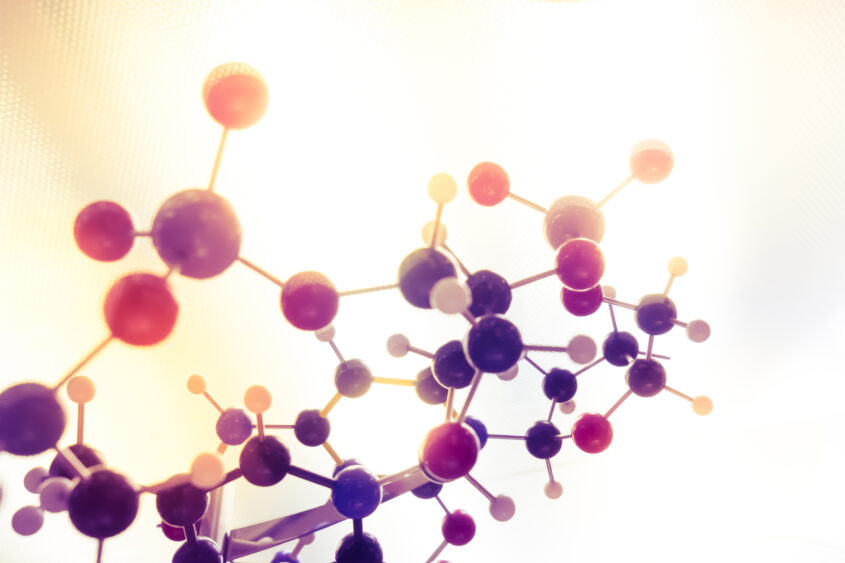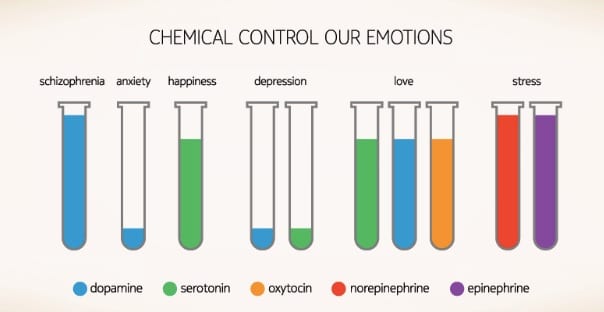Every thought, action, and emotion involves communications between brain cells that are triggered by special chemicals called neurotransmitters.
It is now generally accepted that most mental disorders involve imbalanced levels or altered functioning of these critically important brain chemicals.
– Dr. William Walsh, Scientist & Author of ‘Nutrient Power’
Our psychology is our biology.
The chemicals and molecules our bodies produce (biology) directly impact what we feel, how we think, how we react, and how we perceive, or how we “read” our environment (psychology).
And vice versa.
Neurotransmitters and hormones are the body’s ‘chemical messengers’; they are signal senders.
They can be considered the biochemical correlates of our emotions and moods and play an important role in our well-being.
Mental illness and mood disorders such as anxiety disorders, bipolar disorder, panic attacks, obsessive-compulsive disorder (OCD), attention deficit hyperactivity disorder (ADHD), and major depressive disorder are all impacted by these chemical messengers.
Even other health conditions such as Parkinson’s disease and Alzheimer’s disease are thought to be influenced by a neurotransmitter imbalance.
Differing levels in these important chemicals lead to states like anxiety, stress, and depression, or love, connection, and bonding:
Chemical messengers aren’t only produced in the brain:
It may surprise you to learn that the brain isn’t the only body part to produce these messenger chemicals.
Turns out our gut brains and the bacteria that live inside our intestines work together to produce their fair share of neurotransmitters and hormones, too.
In fact, 95% of the body’s serotonin (a neurotransmitter that helps maintain balanced moods) is stored inside specialized gut cells, and only 5% is contained in the brain. (1)
The gut also produces the neurotransmitter GABA (gamma-aminobutyric acid) which is known for its calming and relaxing effect on the mind.
The two-way communication between the head brain and the gut-brain relies heavily on these chemical messengers for regulating important body functions, including our emotional state.
According to gastroenterologist and neuroscientist Emeran Mayer: “Serotonin cells are tightly connected to sensory nerves that signal directly back into the brain’s emotion regulating centers, making them an important hub within the gut-brain axis.” (2)
Pay attention to the excesses and deficiencies of your body’s chemicals…
When emotions are expressed…all systems are united and made whole.
When emotions are repressed, denied, not allowed to be whatever they may be, our network pathways get blocked, stopping the flow of the vital feel-good, unifying chemicals that run both our biology and our behavior.
– Candace B. Pert, Molecules of Emotion: The Science Behind Mind-Body Medicine
Both anxiety and depression can be caused by either an excess (high levels) or a deficiency (low levels) of these chemicals OR an excess/deficiency of the precursor molecules and nutrients that the body needs in order to produce the neurotransmitters.
The body utilizes the nutrients we ingest through the food we eat to ultimately produce these chemicals via complex processes where particles are broken down to create other molecules.
For example, both Vitamin B6 and the amino acid tryptophan are precursors that ultimately help the body produce serotonin.
If we are deficient in either Vitamin B6 (maybe due to ongoing use of hormonal contraceptives for example), or deficient in tryptophan (because maybe we do not consume enough quality protein in our diets, or because our body doesn’t break it down appropriately for example), our serotonin levels will not be optimal and we will experience outer symptoms like mood swings, substance abuse, and even major depression.
Dopamine is one of the most well-known “feel good” chemicals.
Dopamine levels rise when we perceive something or someone as pleasurable, when we pursue and achieve a goal, and when we’re grateful.
Dopamine may also help to quiet down the brain’s fear center which is excellent for mental health.
The Difference Between a Neurotransmitter and a Hormone:
As the name suggests, neurotransmitter molecules send information throughout the nervous system and ultimately the central nervous system (your head brain and spinal cord.)
Neurotransmission occurs via nerve cells called neurons that send and receive information via electrical signals.
Parts of a neuron:
dendrites
axon
the cell body
myelin – an insulating layer made up of fat and protein that surrounds nerves. It allows electrical impulses to transmit quickly through nerve cells.
Hormones are produced by the glands of the endocrine system.
For example the hypothalamus, the pituitary gland which produces endorphins, the adrenal glands which secrete noradrenaline, and the thyroid gland.
An imbalance of hormones can lead to various health problems including psychiatric disorders and eating disorders
Emotional balance through chemical balance…
Every thought, feeling, and emotion creates a molecule known as a neuropeptide.
Neuropeptides travel throughout your body and hook onto receptor sites of cells and neurons.
Your brain takes this information, converts it into chemicals, and lets your whole body know if there’s trouble in the world or cause for celebration.
Your body is influenced as these molecules course through the bloodstream, delivering the energetic effect of whatever your brain is thinking and feeling.
– Deepak Chopra, author & doctor
In her book “The Mood Cure,” psychotherapist and Nutritional Therapy pioneer Julia Ross explains the importance of balanced ‘Mood Molecules’:
“Your brain is responsible for most of your feelings, both true and false.
In concert with some surprisingly brainlike areas of your heart and gut, it transmits your feelings through four highly specialized and potent kinds of mood molecules.
If it has plenty of all four, it keeps you as happy as you can possibly be, given your particular life circumstances.
But if your brain runs low on these mood transmitters— whether because of a minor genetic miscue, because it’s used them up coping with too much stress, or because you aren’t eating the specific foods it needs— it stops producing normal emotions on a consistent basis.
Instead, it starts hitting false emotional notes, like a piano out of tune.” (3)
The most common way to balance this chemistry is by taking medication such as SSRIs (selective serotonin reuptake inhibitor) and antidepressant medication, although for many this route isn’t always effective at fully restoring mental health and well-being.
Medication also comes with side effects that must be carefully discussed with your healthcare provider.
Check out “The Mood Cure” for more information on how diet and proper supplementation can help balance your inner chemistry to create more inner calm and groundedness.
REFERENCES
:
(1) https://www.ncbi.nlm.nih.gov/pmc/articles/PMC2694720/
(2) Emeran Mayer, MD, The Mind-Gut Connection, 2016
(3) Julia Ross, The Mood Cure: The 4-Step Program to Take Charge of Your Emotions–Today, 2003
















